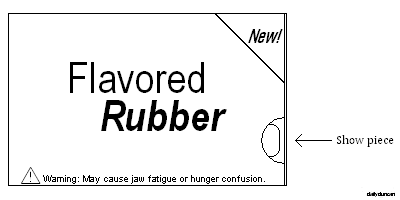Talking, much like walking, is a necessary function that can be fun but becomes tedious over time. Slang helps to keep things interesting by constantly rearranging and adjusting the meaning of words, but its downfall is that it renders previously meaningful language unusable. Clams, cheddar, green, dough and paper are all slang terms for money, but they are not new words; they were redefined for the ignoble purpose of attempting to appear original. By taking words that have a specific use and applying them to something else, language is eroded and our vocabularies shrink. This practice is especially foolish when the object being named already has its own word. Language is always evolving – this is inevitable – but we do not need more words for money.
Sometimes something completely new is discovered and needs to be named, but instead of redefining an existing term why not create entirely new terminology? Everything was nameless at some point, so we shouldn’t hesitate to assign new titles to new things. Unfortunately, inventing an entirely new term may seem simple, but making a word that sounds legitimate is more complicated, for speaking a meaningless word produces noises that seem fabricated and unnatural. We can reduce this effect by engineering our word to resemble existing English words. The simplest way to do this is to simply switch a few letters in two already established words.
First, choose two words. Let’s pick some that aren’t too complex or unique-sounding. As an example we will use some words that are right at our fingertips: shift and delete.
Second, we take the first sound of each word, which in this case would be sh and d, and switch them. The result is two brand new words: shelete and dift. Fun and easy, right? Let’s practice a few more.
- silk hamper = hilk samper
- nice tool = tice nool
- gutter hulk = hutter gulk
This method can also be used to create nicknames for friends and family as well as original names for pets and babies. It works basically the same way as with words, but we choose two names instead.
- Peter Smith = Smeter Pith
- Bill Scott = Skill Bot
- Jenny Williams = Wenny Jilliams
Most of these examples are pretty straightforward. We take the consonant sound from the beginning of each word or name and exchange them. But what about words and names that don’t begin with consonants? Let’s try Adam and Charles. Because Adam does starts with a vowel sound we simply switch the ch sound from Charles to Adam, which produces Chadam Arles.
What about when neither of the two words starts with a consonant sound, as with Oliver and Amos? We simply switch the vowel sounds, giving us Aliver Omos. Because we are alternating the sound and not merely the letters of the two components, we must sometimes alter the spelling of the new words or names so that they are properly pronounced. Aliver Omos would be more accurately spelled Aeliver Ommus.
Okay, so what do we do when one or both of the words starts with multiple consonant sounds, such as glamour and freedom? We actually have two options in this scenario, for it is viable to switch either the first or both the first and second consonant sounds, producing either glamour and greedom or framour and gleedom.
Go ahead and give it a try using the names of people and items around you. Nineteen words of caution: letter switching is highly addictive, so be sure to practice reservation or you may test the patience of others.
Good luck microing your Stink Blockers.
